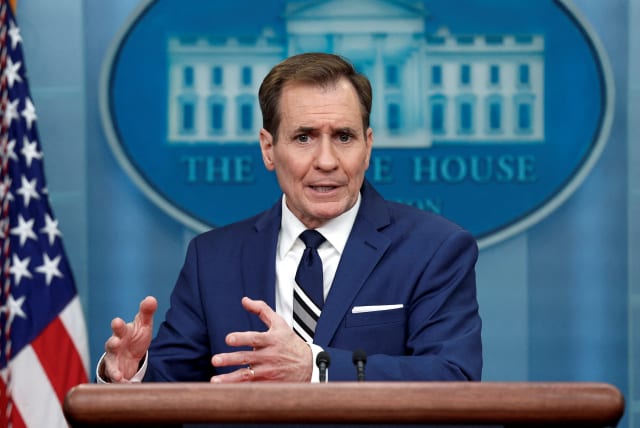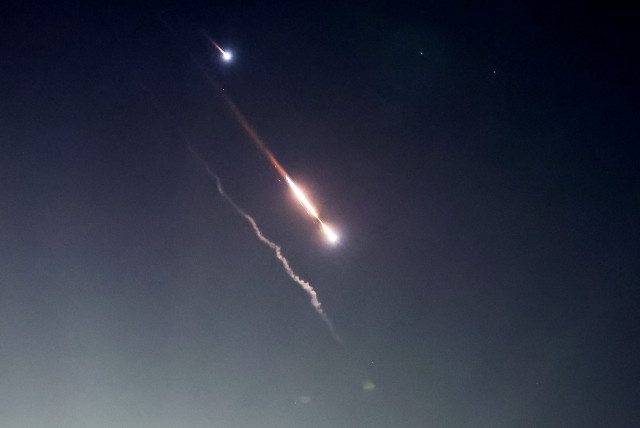US doesn’t seek war with Iran, looks to curb Israeli response

“We don't want to see this escalate. We're not looking for a wider war with Iran," John Kirby told NBC on Sunday.
The United States is not interested in a war with Iran, the White House said on Sunday, as it sought to de-escalate regional tensions in the aftermath of Iran’s first direct attack on the Jewish state, and prevent a harsh IDF response.
“We don’t want to see this escalate. We’re not looking for a wider war with Iran,” US National Security Communications Adviser John Kirby told NBC’s Meet the Press on Sunday morning.
But, he stressed, the US “will continue to help Israel defend itself.”
“We made it very clear to all parties[,] including Iran, what we would do and how we would continue to defend Israel and also how seriously we would take any potential threat to our personnel and our facilities in the region,” Kirby stated.
He spoke as Prime Minister Benjamin Netanyahu and Defense Minister Yoav Gallant held meetings with the war cabinet and the security cabinet to decide what Israel’s response should be, amid reports that US President Joe Biden had personally prevented Netanyahu from issuing orders for a direct attack.
President Isaac Herzog told Sky News on Sunday that Israel was considering all options, in a situation where Iran had effectively issued a “declaration of war.”
A US official, however, said that “Israel made clear to us, it was not seeking escalation.”
An official stressed to reporters that the US would not be involved in any potential Israeli response to the Iran attack. US officials who briefed reporters after the dramatic events of late Saturday night explained that this was the first time that Iran had directly attacked the Jewish state.
It came after four decades of shadow wars, including Israel’s battles over the last half-year with Iranian proxy group Hamas in the South, Hezbollah in the North, and the Houthis in Yemen.
"Incredible military achievement"
Israel defended itself against a barrage of over 300 ballistic and cruise missiles, and drones, launched at the Jewish state from Iran, Iraq, Syria, and Yemen.
In an unprecedented move, Israel prevented 99% of the missiles from reaching their targets with the help of a coalition of armed forces that included the armies of the US, the United Kingdom, France, and Jordan.
US officials told reporters that the Biden administration had begun preparing 10 days ago for a coordinated response to such an attack, in light of Israel’s strike in Damascus that killed seven Iranian officials on April 1, including one senior IRGC official.
Biden had given instructions to the relevant US officials and bodies to defend Israel to “the maximum extent possible,” US officials said.
He was the first “American President to directly defend Israel. He followed and directed every detail of his response, starting nearly two weeks ago, as we began to receive indications that Iran was preparing for a large-scale attack” with the aim of causing “significant damage and deaths.”
Had the attack been “successful,” it could have caused “an uncontrollable escalation,” something which the US had attempted to avoid since October 7, the officials added.
In advance of the attack, US officials have been in constant contact with their Israeli counterparts, and other partners in the region, as well as with Iran with a series of direct communications through a Swiss channel and other relevant players. They also held conversations with Turkey, China, Iraq and India.
Israel’s Ambassador to the US Mike Herzog and the embassy’s defense attache visited the White House to walk through the response to the attack in advance, as CENTCOM Commander Michael Erik Kurilla was in Israel in the days leading up to it. On Saturday, Biden returned early from a trip to Delaware to be in the situation room at the White House, as events unfolded.
The official described the tense moments: “We knew there were over 100 ballistic missiles in the sky, with a short period of travel time to Israel and the result of the defense [efforts in the skies] was unclear.” Then, as the results came in, there was a “bit of a breath of relief.”
Simultaneously in Israel, Netanyahu sat with his war cabinet, the US officials described. Around 9 p.m. Saturday – about 3 a.m. Sunday morning in Israel – the two leaders spoke.
“The President reaffirmed our unwavering support for Israel’s defense. But again, the context for the call, I think keep in mind, [is] that both leaders had just gone through the 10 days of preparations and then the results which were just becoming known and we were feeling pretty good about where we were,” a US official said.
Biden assured Netanyahu that Israel “really came out far ahead in this exchange,” an official said, starting with the Damascus strike.
Iran then responded, and Israel “clearly demonstrated its military superiority in defeating this attack, particularly in coordination with others.”
Biden has been clear that the actions of Iran and its proxies against Israel end here.
The US has an “ironclad commitment” to Israel’s security and proved that this weekend, an official said.
They further stressed that “Iran intended to cause significant damage, and they failed in their mission to do so.”In his public statements on US media channels, Kirby said that the US was remaining vigilant to potential threats from Iran, including to its own personnel and troops.
Biden, he said, is focused on using diplomacy to constrain the situation and is doing so “personally.”
Kirby told ABC’s This Week that everything Biden has done since the start of the Israel-Hamas on October 7 “has been to try to keep this from becoming a wider regional war.” Over the last few days, the US moved destroyers and fighter squadrons into the region to help Israel defend itself, he explained.
Kirby described to NBC the joint defensive operation against Iran as “an incredible military achievement by Israel, and quite frankly, the United States and other partners that helped Israel defend itself against more than 300 drones and missiles.”
He lauded Israeli “military superiority,” in particular.
The maneuver also demonstrated that Israel “has friends that it’s not standing alone, that it’s not isolated on the world stage," he added.
Jerusalem Post Store
`; document.getElementById("linkPremium").innerHTML = cont; var divWithLink = document.getElementById("premium-link"); if (divWithLink !== null && divWithLink !== 'undefined') { divWithLink.style.border = "solid 1px #cb0f3e"; divWithLink.style.textAlign = "center"; divWithLink.style.marginBottom = "15px"; divWithLink.style.marginTop = "15px"; divWithLink.style.width = "100%"; divWithLink.style.backgroundColor = "#122952"; divWithLink.style.color = "#ffffff"; divWithLink.style.lineHeight = "1.5"; } } (function (v, i) { });

